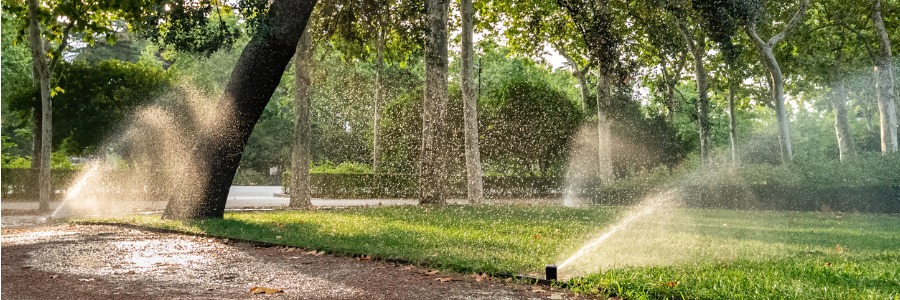
There’s a misguided belief that more water means a healthier landscape. Just set the irrigation system to run automatically on a programmed schedule to thoroughly saturate the landscape. But stormy weather cannot be scheduled, and soils deep below the ground surface can become waterlogged and drown plant roots. The truth is less water used more efficiently will actually keep landscapes healthier. How is that possible? It’s called Smart Water Management.
Smart Water Management reduces water use by 33% by utilizing a Smart Irrigation Controller. The Smart Controller will automatically adjust watering schedules based on real-time weather conditions, soil moisture content deep in the root zone, and individual plant needs on any given day.
The Smart Controller is not manually set to run automatically on a programmed schedule, rain or shine. It’s managed via the Cloud to water efficiently based on ET Everywhere* weather data, and by soil moisture readings electronically transmitted to the Smart Controller in real time.
Here’s how Cloud-based Smart Water Management of irrigation stacks up against manually programmed watering schedules, and how it can protect and keep landscapes healthier with significantly reduced water usage.
- Smart Controllers use less water more efficiently by automatically adjusting irrigation in response to daily, local evapotranspiration (ET) data. Rather than depending on historical ET data, ET Everywhere* relies on actual ET data in real time. It is the most precise, high-resolution weather data available, and can differ from historical ET by as much as 100% over a given week, and as much as 225% on any given day. This, as opposed to a manually pre-set irrigation schedule that will automatically water a landscape, rain or shine.
- Smart Controllers also use less water more efficiently, based on real-time soil moisture content readings electronically transmitted by Soil Moisture Sensors buried deep beneath the ground surface. Like a thermostat for the landscape, these ultra-sensitive sensors can measure soil moisture levels where it matters most– in the root zone of plants– to within ± 3 percent of the actual volumetric soil moisture content.
Soil Moisture Sensors save money because they reduce water usage up to 62% or more over traditional irrigation methods. This, as opposed to a manually pre-set irrigation schedule that can easily overwater plants to the point of oversaturating plant roots and soils, resulting in wasteful water runoff on the ground surface.
During these times of severe drought, Smart Water Management also makes it easier to meet mandatory water reduction requirements with reduced water use, and still maintain healthy landscapes.
In a nutshell, Smart Water Management will significantly reduce water use, save money, and actually grow healthier landscapes. That’s because irrigation schedules are not manually set on a pre-programmed schedule to water copiously, regardless of weather conditions or if soils beneath the ground surface are oversaturated. Smart Water Management is based on real-time weather, changing soil conditions and varying plant needs.

